8 Best COBOL Courses for 2024: Maintaining the Mainframe
Need to master the mainframe? Here are the best free and paid courses to learn COBOL, the ancient language powering banks and businesses worldwide.
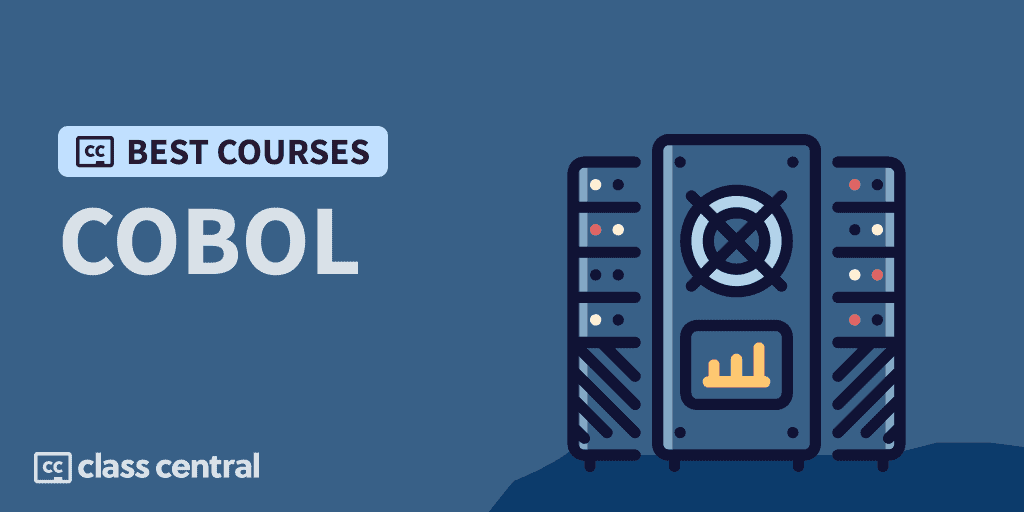
COBOL is no ancient relic of the past, gathering dust on the shelves of computer history. Nor is it hung up in the past either, unable to catch up with the newfangled programming fads of its younger brothers and sisters.
COBOL has, in fact, been the beating heart of the business world for over 60 years. It is the silent giant secretly running the mission-critical operations around us. Banks? Insurance? Governments? Though they may slap a sleek modern interface in Java on the frontend, it is all COBOL on the backend handling the world’s most important transactions and records.
Don’t let myths surrounding COBOL’s age fool you. It is very much alive and relevant in the business world, especially in decades-old industries and companies. If you want to join their ranks and keep the ancient heart beating, read this Best Courses Guide (BCG) to find the best free and paid online courses to learn COBOL.
Click on the shortcuts for more details:
Here are my top picks. Click on one to skip to the course details:
| Course Highlight | Workload |
| Best Free Course for Beginners (IBM) | 16 hours |
| Best Free Comprehensive Video Series (Vijay Kumar) | 10 hours |
| Best Introductory Course for Programmers (LinkedIn Learning) | 3–4 hours |
| Best Specialization to get Employed (IBM) | 50–100 hours |
| Best Free Taster Course (Derek Banas) | 2–3 hours |
| Best if You Have Basic Mainframe Experience (Sandeep Kumar) | 10 hours |
| Best Introductory Course for New Programmers (Tom Taulli) | 6 hours |
| Also Great Introductory Course for Programmers (Tom Taulli) | 2–3 hours |
What is COBOL?
Common Business-Oriented Language (or COBOL for short) is a programming language specifically developed for business applications. It was created in the 1950s to revolutionize the business world in the same way that programming languages like Fortran had already changed the way scientific and mathematical research was conducted. Just like Fortran, it was designed to be readable by being similar to English, while also being highly flexible.
Sixty years later, COBOL is not dead, despite what others may want you to believe. There are over 220 billion lines of COBOL code in operation, which represents approximately 80% of all actively used code, and around 1.5 billion lines of new COBOL code are written each year. COBOL transactions are executed 200 times more than Google searches every single day, which shows that COBOL has made its impact for the years to come. And according to this video released in December 2023, the most important programming language to learn in 2024 for job security is COBOL!
COBOL is the heart of many large volume data processing industries like banking, insurance, and government systems. It powers mission-critical business applications such as credit card processing, payroll, insurance claims, and medical records. It can be said that COBOL is to business as Fortran is to STEM.
However, there is currently a shortage of programmers skilled in COBOL, as many of the experienced COBOL programmers from the 1970s and 1980s are retiring. This has led to a demand for programmers who can review and update existing COBOL code and troubleshoot any issues that may arise. Right now, COBOL developers can expect a median salary of $97,800, according to the Lightcast Job Postings Report.
Despite its age, COBOL is still a critical programming language that is expected to remain in use into the foreseeable future. It is continually updated to incorporate modern programming paradigms and best practices. If you are interested in becoming a full-stack developer in large enterprises with critical systems, you can be sure that they’re using COBOL and that you will need to be proficient in it as well.
Courses Overview
- Around 1.6K people are following the COBOL subject on Class Central
- All of the courses in this BCG except for two are suitable for beginners
- 7 of the courses are free, free-to-audit, or have free trial, while 1 is paid.
Best Free Course for Beginners (IBM)
IBM’s COBOL Programming with VSCode is an open-source course that’s the result of a collaboration between American River College, IBM, and its clients under the Open Mainframe Project. The project provides a set of training materials and labs for Enterprise COBOL on IBM mainframes running z/OS. In fact, you’ll have the opportunity to develop and familiarize yourself with actual mainframe environments by registering here.
In this free-to-audit course, you’ll build a working understanding of COBOL programming. It describes how to work with COBOL using modern tools like Visual Studio Code with Zowe and ZOpen Editor extensions. By the end, you’ll be able to write, test, execute, and debug basic COBOL programs.
This course can also be found on YouTube (free) and Pluralsight (paid).
What you’ll learn:
- Fundamentals: structure and syntax, setting up VSCode environment, understanding divisions and numbered columns, reserved words and their meanings
- Data: creating data names for specific data types and values, performing operations with data, understanding the execution order of COBOL code, controlling program flow with branches and loops
- Advanced concepts: file handling, program linkage, generating reports
- Practice: arithmetic and conditional statements, intrinsic functions provided by COBOL.
Upon completion of the course, the instructor recommends that you explore the other learning materials and exercises available on the Open Mainframe Project GitHub. The Open Mainframe Project maintains a forum as well as a Slack channel.
This is a fantastic complement to the IBM z/OS Practitioner path for the IBM Mainframe course. It’s also partially translated to French.
| Institution | IBM |
| Provider | Coursera (and others) |
| Instructor | Jeff Bisti |
| Level | Beginner |
| Workload | 16 hours |
| Enrollments | 10.6K on Coursera, 177K views on YouTube |
| Rating | 4.7/5.0 (172) on Coursera, 4.4K likes on YouTube |
| Exercises | Practice quizzes and lab exercises |
| Certificate | Paid |
Best Free Comprehensive Video Series (Vijay Kumar)
In Vijay Kumar’s Mainframe COBOL series of free video tutorials, you’ll learn about mainframes and how they are used in conjunction with the COBOL programming language. You’ll be given enough understanding of COBOL programming language to be able to explore the deeper aspects of the language and mainframes on your own.
You should be familiar with software programming to take this course.
This course covers:
- Introduction to mainframes: definition and characteristics, importance in critical applications and data processing
- Communication with mainframes using COBOL: batch and online processing, understanding COBOL’s role in commanding mainframes
- Fundamentals of COBOL programming: structure of a COBOL program, segments and divisions, programming statements and expressions
- Advanced COBOL concepts: file handling – sequential, indexed, and VSAM files, interaction with DB2 and IMS databases, searching and sorting through tables
- Practical examples: using COBOL to solve business problems.
Vijay Kumar is a mainframe developer with over a decade of experience. His channel shares the knowledge he has gained in the form of videos, teaching mainframe concepts and languages like COBOL, JCL, VSAM, CICS, DB2, PL/I, TSO, interview questions, SDLC Process, real time practices, use cases, and more.
| Channel | Kumar IT Channel |
| Provider | YouTube |
| Instructor | Vijay Kumar |
| Level | Beginner |
| Workload | 10 hours |
| Views | 463.7K |
| Likes | 476 |
| Certificate | None |
Best Introductory Course for Programmers (LinkedIn Learning)
COBOL is alive and well!
COBOL Essential Training with free trial teaches the basics of COBOL programming to new and experienced programmers. You’ll set up a working development environment and learn the language’s data types, control structures, file organization and processing methods, tables, and strings. The course also focuses on reviewing and updating existing code rather than writing new COBOL programs, as most COBOL developers are doing today.
In this course, you’ll:
- Set up VSCode environment on Windows
- Write a “Hello World” program
- Understand COBOL syntax through user input
- Learn COBOL’s data types: literal and figurative constants
- Control structures: conditional expressions and perform statements
- Handle files and strings
- Generate tabular data from input files using tables
- Advanced topics: direct access, relative, and indexed files
- Troubleshoot techniques for identifying and fixing errors.
Peggy Fisher is a programmer and content manager at LinkedIn Learning. She has experience in programming languages such as Java, Arduino, and C++, and has also worked on creating courses on COBOL and discrete mathematics.
| Provider | LinkedIn Learning |
| Instructor | Peggy Fisher |
| Level | Intermediate |
| Workload | 3–4 hours |
| Enrollments | 83K |
| Rating | 4.7/5.0 (459) |
| Exercises | Chapter quizzes and code challenges |
| Certificate | Paid |
Best Specialization to get Employed (IBM)
IBM Mainframe Developer Professional Certificate is a more comprehensive series of courses on COBOL and Mainframe development compared to the other IBM course in this BCG.
You’ll cover the history and evolution of COBOL in this specialization that consists of free-to-audit courses. You’ll learn about COBOL programming basics, TSO, ISPF, mainframe data management and software development techniques, and more. Upon completion of the course, you’ll have the skills and portfolio necessary to start a career as a mainframe programmer.
No programming skills or knowledge of mainframes is required to take this course.
What you’ll learn:
- Course 1: Introduction to Enterprise Computing
- You’ll identify and explain different architectural families of mainframe systems along with the functions of an operating system
- Course 2: IBM COBOL Basics
- Briefly covers the history of COBOL, before teaching basic programming concepts like syntax and semantics by covering variables, data types, arithmetic and logical operations, and program structure
- Course 3: IBM COBOL Core
- Adds on to what you’ve learnt by teaching you how to control the flow of a program, generating and handling tables, and numeric usage
- Course 4: IBM COBOL Software Development Practices
- Introduces core practices, systems, and methodologies associated with IBM COBOL software development, including maintaining code that other developers have written
- Course 5: IBM COBOL Data and File Management
- You’ll learn the process of working with data and files in COBOL, including reading and writing. You’ll also learn the best data types for your needs and how to use relational databases in a mainframe environment
- Course 6: IBM COBOL Basic Testing and Debugging
- Covers a quintessential part of development— debugging and testing. You’ll describe common errors that can appear when working with COBOL and how to fix them
- Course 7: IBM COBOL Software Development Process
- A solid foundation in Software Development Lifecycle (SDLC) core concepts and technologies will be covered, including: life cycle and systems analysis, design and structured coding, and more.
Jeff Bisti is an EcoSystem Architect at IBM Systems, with a focus on enterprise systems and hands-on experience with z/OS and Linux. As an IBM Z trainer, he is responsible for creating training material and designing content for people of all skill levels. As in IBM’s COBOL Programming with VSCode, you’ll be able to use IBM’s mainframe for the labs.
| Institution | IBM and LearnQuest |
| Provider | Coursera |
| Instructors | Jeff Bisti and Erik Herman |
| Level | Beginner |
| Workload | 50–100 hours |
| Enrollments | 3.9K |
| Rating | 4.4/5.0 (217) |
| Certificate | Paid |
Best Free Taster Course (Derek Banas)
Learn COBOL in One Video is a very short course focusing on introducing programmers to essential COBOL concepts and syntax. By the end of this free course, you’ll have a taste of what the language is all about.
Programming experience is required to take this course.
What you’ll learn in this course:
- COBOL’s unique structure and syntax due to its long history
- Exploring main divisions of a COBOL program: identification, environment, and data
- Declaring data names (variables) and following naming conventions
- Performing mathematical operations
- Using conditional statements and loops
- Understanding subroutines and linkage for powerful programs
- Working with files: opening, reading, and writing
- Creating reports and tables in COBOL
- Sorting records, merging files, and other data operations.
The course is based on a book called Beginning COBOL for Programmers. Derek Banas is a prolific YouTube educational content creator. He has made around 50 videos covering the basics of different programming languages, as well as data science and machine learning, statistics, and linear algebra.
| Provider | YouTube |
| Instructor | Derek Banas |
| Level | Beginner |
| Workload | 2–3 hours |
| Views | 256K |
| Likes | 5.9K |
| Certificate | None |
Best if You Have Basic Mainframe Experience (Sandeep Kumar)
A great introduction to COBOL for mainframe programmers is Mainframe: The Complete COBOL Course From Beginner To Expert. By the end of this paid course, you’ll be able to clear job interviews for COBOL positions.
To take this course, you should know the basics of TSO/ISPF and JCL.
You’ll cover these topics:
- COBOL’s background and history
- Accessing the mainframe
- Variables, constants, and data types
- COBOL program structure
- Basic commands in TSO/ISPF (arithmetic operations, conditional processing, iterations, and calling subroutines)
- Tables (including searching, sorting, and string handling)
- File handling
- DB2 concepts.
Sandeep Kumar is a programmer with over 12 years of experience in a variety of programming languages, including Python, Java, PHP, Perl, and JavaScript. He has also worked on Mainframe technology such as TSO/ISPF, JCL, VSAM, Cobol, DB2, CICS, and IMS, and is also an IT consultant in Big Data and Cloud Computing, and has experience in website development. He is the founder of a training company in India that offers online courses in IT and other subjects.
| Provider | Udemy |
| Instructor | Sandeep Kumar |
| Level | Beginner |
| Workload | 10 hours |
| Enrollments | 16.6K |
| Rating | 4.5/5.0 (3.6K) |
| Certificate | Paid |
Best Introductory Course for New Programmers (Tom Taulli)
Murach’s Mainframe COBOL is a paid course with free trial based on a popular book with the same name.
This course teaches everything you need to know about COBOL to get employed. You’ll cover COBOL tools for the mainframe and the PC, COBOL syntax and semantic features, and how to use COBOL for databases and transaction systems. By the end, you’ll have a solid foundation to get started developing COBOL applications.
No prior experience with programming or access to a mainframe is required for this course.
This course covers:
- Understanding COBOL’s history and its use with mainframes
- Contextualizing the language’s structure and syntax
- Functions of mainframes: batch processing and online transaction processing
- Setting up a COBOL environment with necessary tools and IDEs
- Exploring COBOL syntax: structure, statements, data and procedure divisions
- Utilizing mathematical operations, loops, and conditionals
- Learning to maintain COBOL code
- Creating tables and reports for business specifications
- Working with copy members and subprograms
- Handling sequential, indexed, and VSAM files
- Using SQL to interact with databases
- Developing CICS programs for online transaction processing.
Tom Taulli is an author and programmer with a long history in the field. He has written two books, “Modern Mainframe Development: COBOL, Databases, and Next-Generation Approaches” and “The Robotic Process Automation Handbook: A Guide to Implementing RPA Systems” and has been programming since high school.
| Provider | Pluralsight |
| Instructor | Tom Taulli |
| Level | Beginner |
| Workload | 6 hours |
| Certificate | Paid |
Also Great Introductory Course for Programmers (Tom Taulli)
If you already know how to program, the author of the previous course has made the COBOL Fundamentals course just for you. You’ll learn the basics of this language and will be able to create your own applications by the end of this paid course with free trial.
To take this course, you should have some understanding of computer languages.
What you’ll learn:
- Core concepts of COBOL
- Explore language features and structure: variables, loops, conditionals, functions
- Learn to use mainframe development systems: TSO and ISPF
- Understand important business functions in COBOL
- Create tables and reports
- Set up data in a program: sequential, index, VSAM
- Work with different types of files including transaction systems: CICS and databases
- Search through tables and handle strings.
In college, Tom Taulli started a company that sold Windows software for exam preparation, and later founded other companies, including Hypermart.net, a mid-1990s version of Shopify that was later sold to InfoSpace.com.
| Provider | Pluralsight |
| Instructor | Tom Taulli |
| Level | Beginner |
| Workload | 2–3 hours |
| Certificate | Paid |
Why You Should Trust Us
Class Central, a Tripadvisor for online education, has helped 60 million learners find their next course. We’ve been combing through online education for more than a decade to aggregate a catalog of 200,000 online courses and 200,000+ reviews written by our users. And we’re online learners ourselves: combined, the Class Central team has completed over 400 online courses, including online degrees.
Best Courses Guides Methodology
I built this ranking following the now tried-and-tested methodology used in previous Best Courses Guides (you can find them all here). It involves a three-step process:
- Research: I started by leveraging Class Central’s database and the internet. Then, I made a preliminary selection of COBOL courses by rating, reviews, and bookmarks.
- Evaluate: I read through reviews on Class Central, Reddit, and course providers to understand what other learners thought about each course and combined it with my own experience as a learner.
- Select: Well-made courses were picked if they presented valuable and engaging content. Selection criteria includes comprehensive curriculum, affordability, release date, ratings and enrollments.



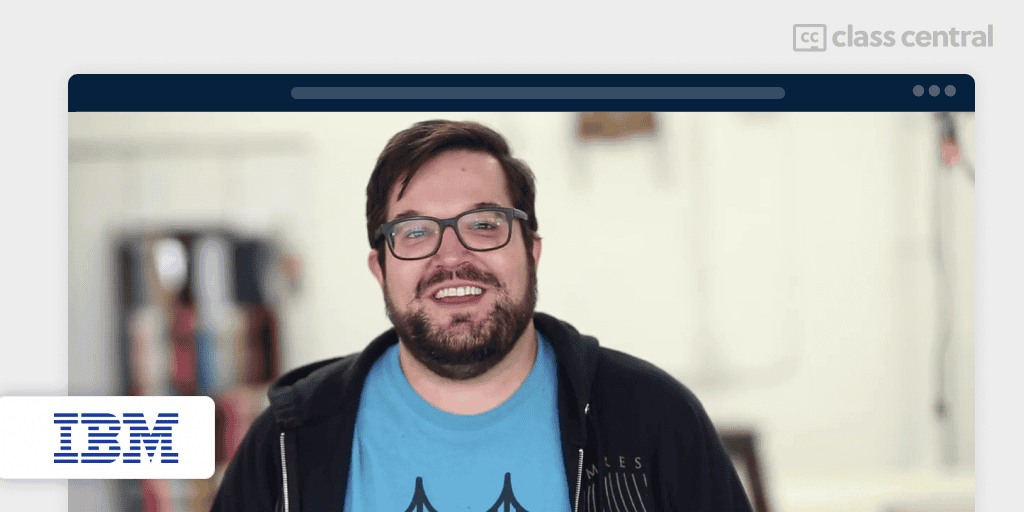
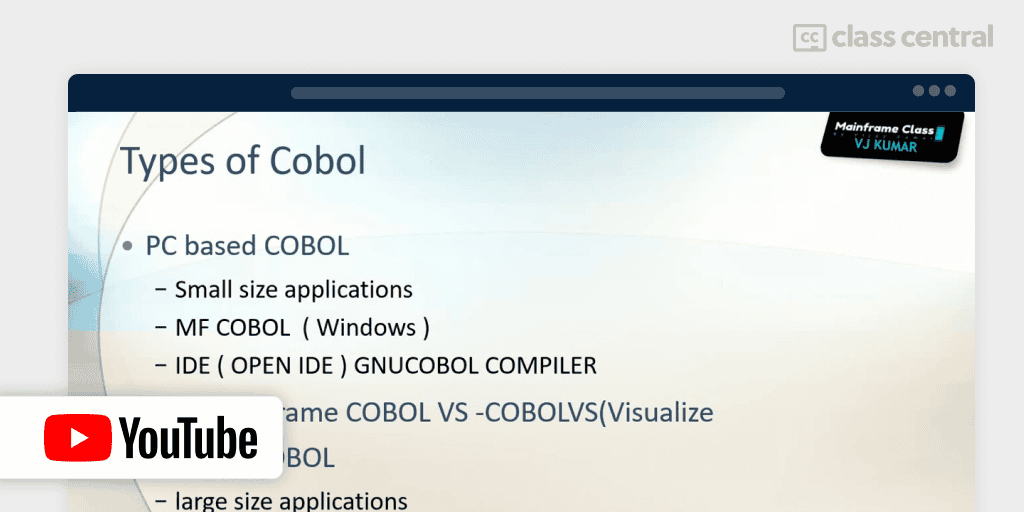
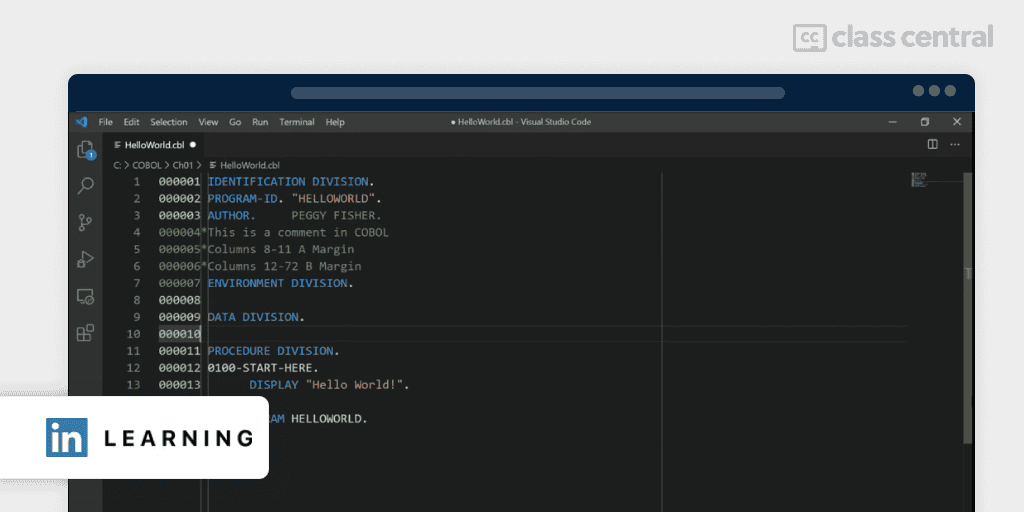
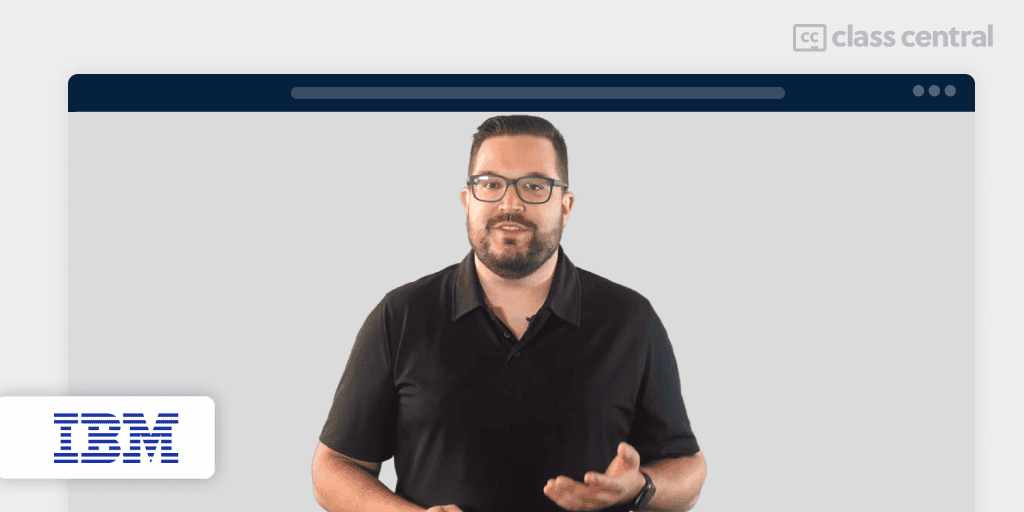
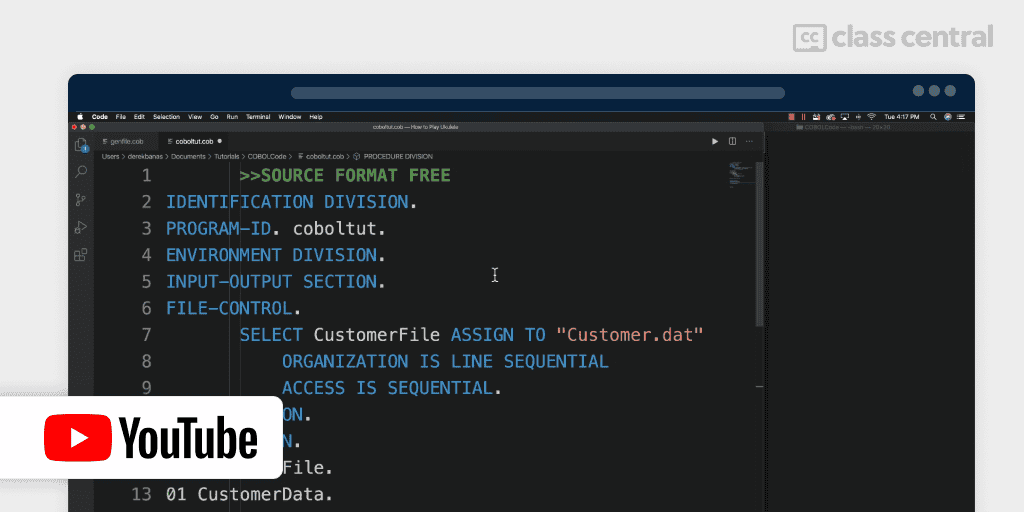
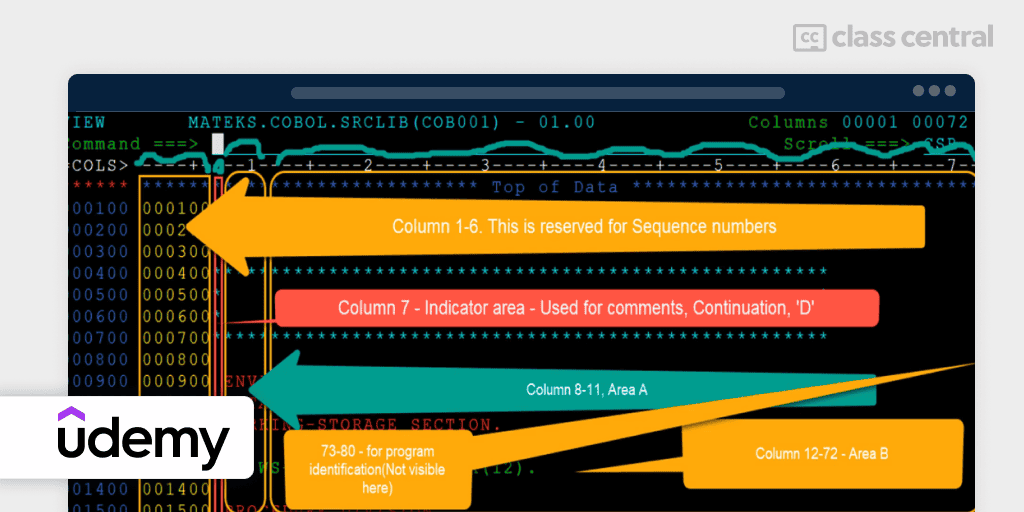
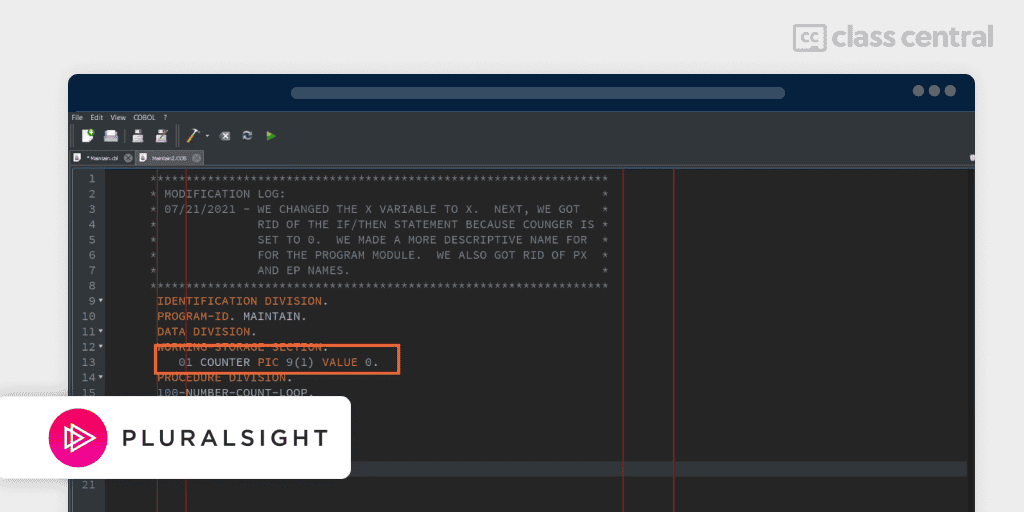
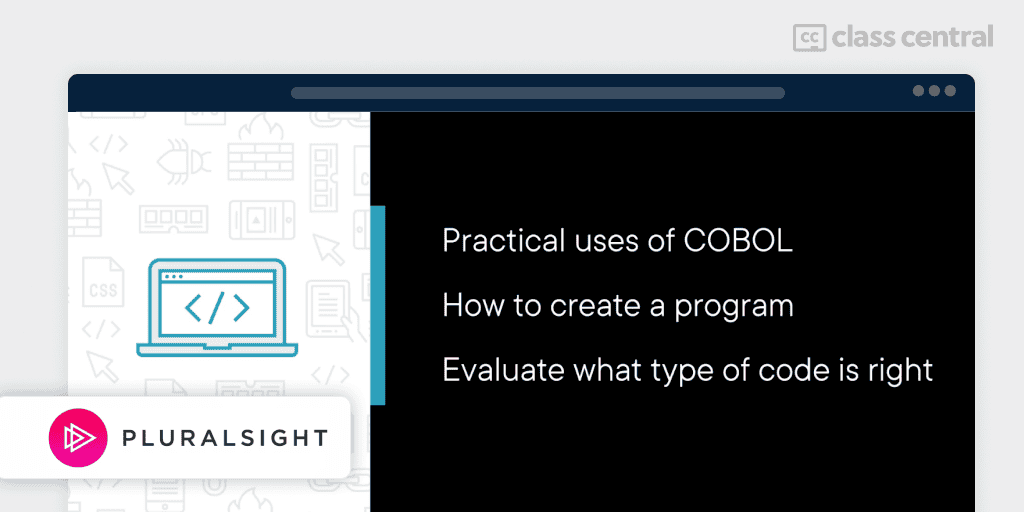







Paresh Mehta
I have learnt COBOL in the year 1990 as a part of curriculum. Then after I have conducted lectures on COBOL for more than 12 years. In our town only 2 to 3 persons were there on that time to conduct the lectures. I was one of them. At present I am able to conduct lectures as well as develop applications in COBOL.